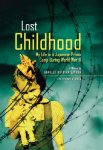Through the Looking Glass Children's Book Reviews
Lost Childhood: My Life in a Japanese Prison Camp During World War II
Nonfiction
For ages 9 to 11
National Geographic Children's Books, 2008 ISBN: 978-1426303210
Until she was four years old, Annalex had a charmed childhood. She lived in a house in Surabaya on the island of Java with her mother, her big brother Jack, her father, and her grandmother. Annalex, her brother, and her parents had all being born in what was then called the East Indies, but they still spoke Dutch, and considered the Netherlands to be “back home.” They worried when Hitler’s armies invaded the Netherlands, but that conflict seemed so far away, and it did not directly affect them much. Then the Japanese began to invade countries in Asia, and life began to change in Annalex’s happy world.
The first thing that changed was that a bomb shelter was built in the front yard, and soon enough Annalex and her family had cause to use it. Her father was a pilot, and to ensure that the Japanese did not capture him or his plane, he was ordered to fly his plane to Australia. He never arrived, and his family had no idea if he was dead or alive.
Soon after this terrible event, the first Japanese soldiers arrived, and it wasn’t long after their arrival that Annalex’s mother was told that she and her family were going to be relocated to an internment camp. Carrying only a few of their belongings, Annalex, her mother, her brother and her grandmother went to the train station. Jack was ten years old so he was taken away to live in a camp for male prisoners. Annalex would not see him for years.
Life in the internment camp was nothing like the life Annalex had had before the Japanese invaded. She lived in a big building with many other women and children and had to privacy. Food soon became scarce and she was always hungry. Bad as this camp was, it was still better than the one that she went to next.
Told in a very simple, direct, and personal way, this extraordinary account gives readers a picture of what it was like to be a prisoner in Indonesia during World War II. Annalex presents her story as she saw things, through the eyes of a little girl, which makes the narrative powerful and incredibly touching.




